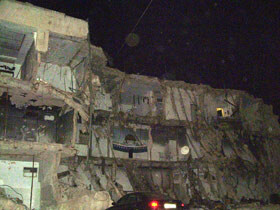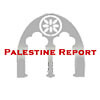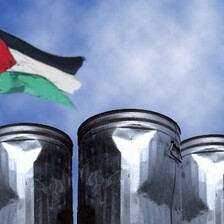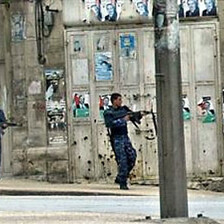Palestine Report 8 April 2005

Inside the Muqata compound (Maureen Clare Murphy)
A video of the break-in shows one of the intruders busting up the blackboard scribbled with the number of tallied votes. Another kicked a ballot box, already emptied. A third man confronted an employee who was trying to hide a few remaining and unharmed ballots. At gunpoint, the man was forced to surrender the papers, another ripping them into pieces before firing a bullet at the ceiling and ordering everyone out of the room.
One of the armed men was asked why his group had ransacked the polling station. “The youth center is a Fateh institution,” he could be heard answering on the video. “It must remain so.”
When the armed mean raided the center, 724 or 81 percent of the votes had already been tallied. The results showed a clear victory for the Hamas candidates over Fateh, endorsed by the armed Aqsa Martyrs Brigades, members of which stormed the center.
“I was shaking from head to toe,” says Amin, who works as a reporter for Agence France Presse. “I wasn’t really scared of the armed men - I am from a refugee camp, you know,” he told Palestine Report. “But I was ashamed and saddened by what happened at the center. Such behavior reflects badly on the camp’s residents just as it reflects badly on the democratic process, which many of the people inside and outside the camp are calling for. I feel we are not ready for elections. Also, it pains me to see that the weapons used in the raid were brandished by people in the resistance or men wanted by the Israeli army. This was a huge mistake.”
The raid on the youth center in Balata coincided with the emergency session of the leadership in Ramallah, held to discuss deterrent measures to contain the chaos among the Aqsa Brigades, who shot at the presidential headquarters - with President Abbas inside - in protest. Then around 26 armed men moved on to the city center, where they stormed a number of restaurants, vandalizing and destroying much of their contents in addition to spreading panic among the people.
Nasser Juma’, one of the Aqsa Brigades commanders in the West Bank said that although what happened was not the “preferred” course of action, it expressed a major complaint among wanted men. Previously, security service chiefs had asked the men leave the Muqata and take residence elsewhere and also hand in their weapons upon an American guarantee for their safety. However, the men felt this was insufficient as long as the Palestinians hadn’t received any reassurances from the Israelis.
Juma’ ultimately held the Palestinian Authority responsible for the Ramallah incident and other tensions with the Brigades, given that its members have remained in a “circle of the unknown,” as he puts it.
Juma’ stressed that the Aqsa Martyrs Brigades played a central role in solidifying the truce or “calm” until now but the PA has not seriously reciprocated. “This is not something we can ignore,” he warned, adding that the PA knows the entire political process depends on the armed wing’s commitment to the truce with Israel. “This is why the PA must seriously consider the file of wanted men,” he says.
Ahmad Saltah, 24, from Nablus is high on the Israeli most-wanted list. In an interview with the Palestine Report he was despondent.
“After President Abbas reached the understandings on a calm or a truce with Israel, we assumed things would get better - that is, we would not be tracked down any longer. We cannot sleep in the same place twice, which means it is very difficult to find safe houses. People, who we know are kind and compassionate, are now burdened by our presence. They no longer open their doors to us. The army pursues anyone who helps us, so these people tell us, ‘we have children we worry about and we have homes we don’t want demolished.’ Last night, I slept in the street, between two cardboard boxes while the army was patrolling the alleys around the corner. Sometimes I don’t have enough money to buy myself a pack of cigarettes.”
Saltah continues, “More than once, high-ranking officials in the PA have asked me to leave Balata and go to Jericho. They told me I would be given an apartment and a car and would receive a regular salary. When I asked them about my colleagues, they would tell me they were not my concern. So I turned them down.”
“The Israeli army only speaks of calm,” he says. “What kind of calm is this? We cannot even eat a proper meal at the dinner table. We don’t enjoy a ‘soldier’s leave.’ And when we try to voice our complaints to the president’s office, we find that our mediators have not passed on the message. We are furious.”
Saltah is accused by Israel of recruiting suicide bombers and sending them across the Green Line to carry out operations. He, like his comrade, Ala’ Sanaqra, are targeted for assassination. Sanaqra is charged with recruiting and providing 18-year-old Zeinab Abu Salem with an explosives belt. Salem, who was from the Askar Refugee Camp in Nablus, blew herself up near the French Hill bus station in Jerusalem on September 21, 2004. Salem and two border guards were killed and 17 others injured in the attack. The next day, the Israeli army demolished Sanaqra’s family home in the Balata Refugee Camp.
Fadi Qafeesheh, 26 is another wanted man from Nablus. Israel accuses Qafeesheh of being the engineer who makes the explosives and bomber belts used by resistance fighters and suicide bombers. The army has already tried to assassinate Qafeesheh more than once but each time he has managed to escape. What he didn’t escape, however, was a bomb that went off in his hands while confronting the Israeli army in June 2004, in the Qasaba quarter of Nablus. Although his colleagues rushed him to treatment, he still suffers from burns to his hands and stomach.
Qafeesheh is extremely wary of the calm. Still, he says he made a promise to Abu Mazen that he intends to keep. He told him he would commit to the truce and not send anyone to carry out attacks inside Israel. However, if the army invades Nablus, he will not stand with his hands behind his back. “I will strike back,” Qafeesheh vows. “Isn’t the truce supposed to be everywhere?”
Just a few days earlier, he says, the army found his secret hideout. “They tampered with my things and left me a sign just to show me they are getting closer. They send messages to security officers, telling them I am not abiding by the truce, claiming I am still strapping people, even children, with explosives to carry out operations inside Israel. That is what the regional commander [Nidal Assouli] told me. I told him they were lying and that I was abiding by the truce. But, if they enter the Qasaba or the city, I will strike back whenever and wherever possible.”
Three weeks ago, a booby-trapped car blew up near a tank that was guarding settlers who had come to the Nabi Yousef shrine in Nablus. Israeli military authorities accuse Qafeeseh for masterminding the attack.
“If the army continues with its raids and incursions, it might push us over the edge and force us to stop honoring the truce,” Qafeesheh says.
Hasan Khreisheh, the deputy speaker of the Legislative Council, says a solution to the issue of the wanted men is crucial to furthering any peace process, but is adamant that, “this is a file that the PA must handle in a way that will guarantee the protection and dignity of the fighters. This is everyone’s demand.”
Khreisheh acknowledges there are armed groups that have digressed from resisting the occupation and exploit their arms for extortion and gaining power in order for their own financial interests. But, “this has only increased because of the weakness of the judicial system,” says Khreisheh. “These groups cause corruption and are connected with certain services. This only shows the clear shortcomings of the police and security services.”
There are approximately 55,000 members of the security forces distributed among the various services. The security budget constitutes 25 percent of the PA’s general budget, which is nearly $2.2 billion while salaries for these services constitute the bulk of this budget.
Khreisheh says the PA does not have a detailed plan to deal with the deterioration of the internal security situation. The Palestinian Independent Commission for Citizens Rights, a semi-official body, says the number of killings reached 93 in 2004 while it was 84 in 2003. In the first three months of this year alone, the number of murders is already 26. “This is why [the PLC] has demanded such a plan so the situation does not get worse by the day.”
The deterioration and chaos were also a top campaign priority for President Abbas, who is currently concentrating on containing the ramifications of the chaos of weapons and lack of security, which has caused him much embarrassment, undermined the PA’s prestige and put him under tremendous pressure.
At the local level, the chaos and lack of security has resulted in a wave of protests throughout the Palestinian territories. A group of businessmen sent a letter to the leadership, demanding that the security Abu Mazen promised during his campaign be achieved. The letter also demanded that grassroots and rights organizations put an end to the chaos in the streets.
At the Israeli level, defense minister Shaul Mofaz expressed his doubts, during a meeting with American officials in Washington, over Abbas’ commitment to the calm and his ability to rein in his forces. “The Israelis are uncomfortable because Abu Mazen has not carried out reforms in the security services,” he said.
According to the Israeli understanding of reforms, “the armed and wanted men must hand over their weapons and register them with the PA in order for the army to stop pursuing them. This is a simple agreement which Abu Mazen is either not able or does not want to implement,” Haaretz military analyst Zeev Schiff wrote on April 1.
There are also uncertainties in Hamas circles because of what one of its leaders, Mohammed Ghazal, described as “hindrances from Fateh-affiliated elements and PA security forces in local elections.”
This intertwining between Fateh and the security services has proven to be problematic for Abu Mazen, who has not yet been able to overcome it even though he was able to come to a conciliatory understanding for a one-year calm with 13 factions during the Cairo talks. “President Abbas has not yet succeeded in absorbing the various military wings of Fateh,” analyst Hani Habib wrote in Al Ayyam on April 3.
Some observers and opposition leaders fear the consequences of the spread of weapons and the lack of continued adherence to the Cairo understandings. These understandings included core issues regarding the consolidation of national unity such as carrying out legislative elections on their scheduled date on July 17 and preparing for Hamas and Islamic Jihad to join PLO institutions.
Ghazal, who was appointed by Hamas as general coordinator for the local and legislative elections in the West Bank, said to PR, “The raid [on the youth center] is a dangerous precedent, which we consider extremely worrying. We want a clear position from the PA that the perpetrators will be held accountable. If such behavior is happening now in a small cultural center, what would be the situation if this occurs in a place where there is parliamentary or municipal campaigning? We want the elections to be conducted in a transparent, dignified and clear manner. If the PA does not fully deal with this violation and similar violations continue, we will not participate in the elections and we will have to deal with such matters differently. We do not want to replace one dictatorship with another.”
On April 1, President Abbas declared a state of alert among security forces, firing Ismail Jabr, head of the security forces in the West Bank and the Ramallah area in addition to other high-ranking security officers, saying they had failed to stop illegal action and chaos in the West Bank and Gaza.
Abbas also decided to put into effect the insurance and pension law for military personnel. There are more than 2,000 military personnel over the age of 60. According to one official, implementing this law will help Abbas make bigger changes in the hierarchy of the security services and retire officers while promoting younger ones to leadership positions. Some sources say Abbas is planning to integrate the armed men in the various security services.
PLC member Abdel Fattah Hamayel, in charge of the wanted men and deportees’ file in negotiations with Israel, said on April 5 that the two sides are close to reaching a final settlement on the wanted men. He said he had received a draft agreement from the Israelis stipulating a general amnesty for all wanted men on condition they do not carry firearms and that they halt their military activities.
In the interview with Al Ayyam, Hamayel said the PA has begun to study the legal aspects of the draft agreement, denying some media reports that say the committee is trying to strip the armed men of their weapons in two weeks. “There are weapons from the security forces that disappeared during incursions. These must be returned to the services. And there are weapons bought with private money. We must find a solution for these.”
Hamayel says the number of wanted men according to the Israeli list is 495 men in the West Bank and two in the Gaza Strip.






